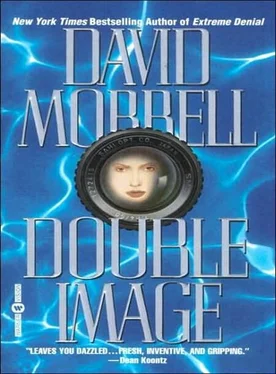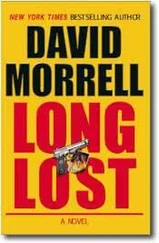“What?”
“You need to rack a shell into…”
Coltrane’s surge of triumph dissipated. In its place, he felt a dismaying humility. He had forgotten that after loading the shotgun, he had to work its pump to insert a shell into the firing chamber. Otherwise, the weapon was useless.
“Right.” Pulling toward him on the handgrip beneath the barrel, Coltrane heard the satisfying snick of a shell being seated in the firing chamber. “Good to have you along.”
“Wouldn’t have missed it.”
Coltrane aimed toward the wasteland, reminding himself that a shotgun was a short-distance weapon. Ilkovic would have to come within fifty yards before Coltrane’s gun would be effective. In the meantime, Ilkovic’s rifle gave him the advantage.
“Where is he?” Coltrane demanded.
“Maybe…” With tremendous effort, McCoy finished his sentence. “… coming behind us.”
A shadow loomed, but when Coltrane whirled, he saw only a continuation of the wasteland. The shadow had been caused by clouds – dark clouds. Throughout his effort to reach the scant cover the ruin provided, Coltrane had paid no attention to the roiling clouds drifting from the west. The ground, not the sky, had been what concerned him. But now the sky was definitely a concern. It was going to rain.
Hearing something scrape behind him, he whirled again. And again he saw nothing. The sound had been caused by a breeze against two charred boards.
The breeze turned into a wind. The clouds darkened.
“The storm will keep us from seeing him.” Coltrane kept glancing nervously toward the area behind him. “Do you have the strength to watch this side while I watch over there?”
“No.” McCoy’s barely audible answer made Coltrane’s scalp prickle.
“Dizzy.” McCoy lowered his head.
“Feel strange.” McCoy dropped his revolver and sank onto his chest.
Alarmed, Coltrane saw that the belt had slipped off McCoy’s shoulder. The blood-soaked pressure bandages had fallen loose. Grabbing the knife, he cut off the left sleeve on McCoy’s coat, slashed it apart at four-inch intervals, made two equal wads of the bandages, and eased them against McCoy’s entrance and exit wounds. He found the belt where it had slipped down McCoy’s right arm. Breathing hard, he again cinched it tightly around McCoy’s right shoulder, pressing the bandages against the wounds, hoping to stop the blood.
McCoy made no response. His only movement was from his chest as it raspingly took in air.
“Don’t die on me,” Coltrane said. “I’ll get you out of here. I promise.”
Sporadic drops of water pelted Coltrane’s face.
Get you out of here? Coltrane thought. How ?
The drizzle intensified. Staring toward the dimming wasteland, Coltrane watched the drops hit the ash, raising puffs. Apart from that and the seething of the clouds, he detected no other movement.
“Photographer,” Ilkovic said.
Coltrane whirled, although an agitated part of him knew that he was only hearing a voice crackle from the walkie-talkie.
“It’s too bad you didn’t bring rain gear,” Ilkovic said. “This morning, you should have listened to the weather report as I did. A military surplus shop sold me an excellent camouflage rain slicker. I know that getting wet will be only a minor discomfort for you compared to what I intend to do, but every little bit counts.”
The deep, raspy voice was louder than it had been during Ilkovic’s last transmission. He was getting closer.
But from which direction?
The drizzle became a downpour. Soaked, his clothes sticking to him, his hair pasted to his scalp and his neck, Coltrane peered around uselessly, his vision so severely reduced that a gray wavering curtain seemed to surround him. He couldn’t see twenty feet away from him.
Ilkovic could be anywhere .
Immediately a corollary occurred to him. But if I can’t see Ilkovic…
He can’t see me .
McCoy’s car. While Ilkovic stalks toward these ruins, I can head for the car. I can get help.
As the warmth of hope fought the chill of the rain, Coltrane braced his legs to crawl out of the crater, then stopped instantly. No, I can’t leave McCoy.
But I can’t take him with me. I’ve got to move as fast as I can.
Coltrane surveyed the crater, squinting toward a jumble of charred beams behind him, to his left. They seemed to be a collapsed section of the roof. Dragging McCoy toward them, he came close enough to see a hollow underneath. Fearful that Ilkovic would find him as he worked, he tugged at one of the beams and created an opening. Despite his efforts to be gentle, he was dismayed by McCoy’s moan as he shoved the unconscious man into the hollow. He rearranged the beams, protecting McCoy from the rain, blocking him from view.
There were two things he did before shoving McCoy in there: He removed McCoy’s car key from his pants and the walkie-talkie from his coat, careful to shut if off. Slipping in the muck that the rain created, black from head to toe, he returned to the rim of the crater, where he grabbed McCoy’s revolver. Mindful of the mistake that he had made with the shotgun, he took care that the revolver’s hammer wasn’t cocked before he shoved the weapon under his belt. Try to think the way McCoy would, he told himself. He picked up the pocketknife, folded its blade, and put the knife in his jeans. He gripped the shotgun in one hand, the walkie-talkie in the other, and concentrated on the downpour. The slime of ash on him was so greasy that it wouldn’t wash off. He imagined he looked as if he’d risen from hell. Unable to detect any motion beyond the gray curtain of water, he told himself that he might as well die trying to do something instead of hiding.
He crept from the ruins.
THEN HE RAN, unable to tell if he shivered from fear or the cold rain lancing against him. His wet clothes sticking to his skin, he felt exposed, naked. His rib cage tightened in anticipation of a bullet that would blast his chest. But a frantic part of his mind tried to assure him that Ilkovic wouldn’t shoot him in so vital a spot. The impact would probably be in an arm or a leg, disabling him, rather than killing him, so that Ilkovic could have his fun. That’s some consolation , Coltrane told himself. Don’t think about it. Move .
But as he tried to hurry through the cloak of the storm, his mind wouldn’t stop working. He kept wondering if he’d made a good choice by heading straight from the ruins in the direction from which he had come. Maybe he should have snuck away on an angle. But wouldn’t Ilkovic be more likely to suspect that he’d try something indirect? Perhaps heading straight out from the ruins was so obvious that it wasn’t obvious at all. For that matter, would Ilkovic even suspect that Coltrane would abandon McCoy and try to sneak away? The possible guesses and counterguesses were maddening.
A dark shape loomed before him. Coltrane dropped the walkie-talkie and aimed the shotgun, or tried to. Rain blurred his vision. His water-heavy eyelids blinked repeatedly as he struggled to peer along the barrel. If his first shot didn’t hit Ilkovic, he would give away his position and make himself a target. He had only one chance to -
The shape wasn’t moving. The shape didn’t resemble a man. It’s my car, Coltrane realized.
But that didn’t mean Ilkovic wasn’t hiding behind it. Retrieving the walkie-talkie, Coltrane backed away, simultaneously veering to his right, wanting to take a wide arc around the disabled vehicle. When he was far enough away that he couldn’t see it anymore, he increased speed, once more running in a crouch.
The air became darker. This time of year, sunset was around five. Soon it would be night.
Читать дальше












